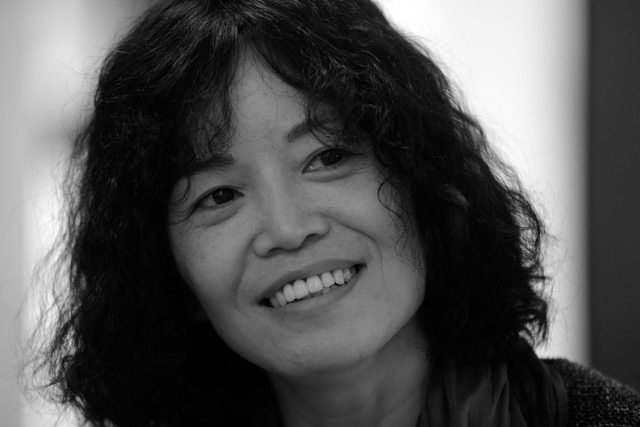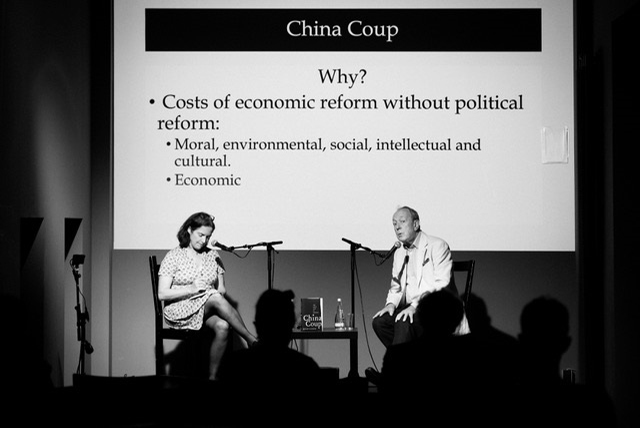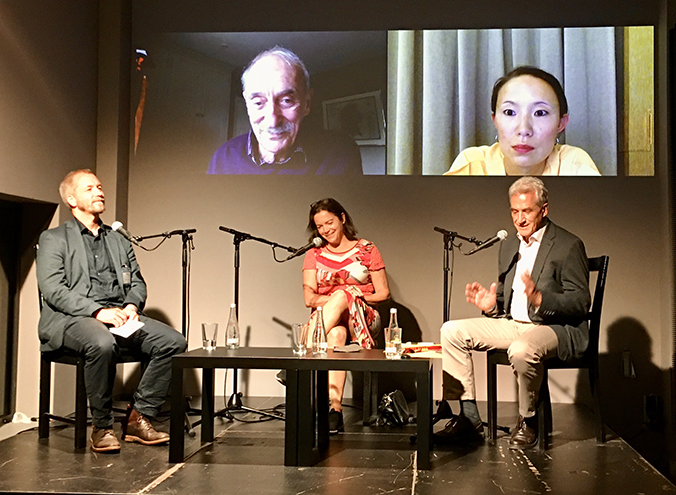毛澤東逝世已經四十五年了,中國的政治制度依然沒有改變。隨著其領導人向左傾斜,這個國家仍然穩定嗎?我們現在來探討一下中國民主轉型的條件。
每年定期於秋季舉行的柏林文學節(ilb2021)堪稱歐洲最大的文學活動。今年的文學節剛結束,「中國的民主轉型」是本次焦距的主題之一。我們可以想像,這是一個能引起人們好奇,心中打上問號的議題。中國在民主轉型方面有怎樣的機會?又是誰能推動這種轉型?為此文學節邀請了來自世界各地的九位知名專家,在不同的小組中進行討論,發表意見。
「幾十年來,中國一直遵循所謂的亞洲增長模式」,前德國駐中國和日本大使佛克·斯丹澤 (Volker Stanzel) 說。但是,儘管每個人都期望中國走向政治改革,但它卻與 「亞洲四小龍」發展的範式背道而馳。
前外交官和開發銀行家羅傑·加賽德(Roger Garside) 並不迴避具有挑戰性的結論。 他指出「中國仍然是 1949 年以來的極權專制體制」。 加賽德出生於 1938年,直到幾年前還被稱為中國的「識途老馬」。早在1958年,他就曾在香港擔任軍官,後來兩次在英國駐北京大使館任職。在他的最新著作中,他預言了習近平主席對中國的權力控制的終結。加賽德詳細地在書中的某一章節,敘述了中國走向民主的演變——他所預見的,並不是一場演變,而是一場政變。政變的領導人將向民主和法治過渡。 他的《中國政變》一書的副標題,就是很有信心地以「自由大躍進」作為副標題的。
雖然大多數分析人士都認為,中國人對習近平及共產黨的支持率,似乎比以往任何時候都更高,但羅傑·加賽德推測,事實恰恰相反。「共產黨是外強中乾」,他給出的原因是:黨的統治造成道德和文化停滯、生態災難、人為高增長率的硬撐式經濟,導致世界上形成了最高的信貸大山。在他看來,中國的問題不僅是國內的,也是國際的。中國不僅需要新的領導人,也需要新的制度。西方民主國家應該利用他們的財政和經濟力量,來鼓勵中國的政治革命,並且「捍衛我們的自由」。當被問及他的大膽假設何時會發生時,他預計最早在明年。 「共產主義政權的轉折點,將在 2022 年 11 月召開的下屆黨代會時到來,屆時必須通過新的五年計劃。反對派將呼籲發動政變,習近平將不會再次當選。」
喬治·馬格努斯 (George Magnus) 出生於 1949 年,是一位獨立經濟學家和評論員。他的研究重點是中國的政治經濟。 2018 年,他出版了《紅旗:為什麼習近平的中國處於危境中》,書中審視了中國當前的經濟體制。和加賽德一樣,他認識到習近平的中國正在轉向更加獨裁專權。但不同的是,他的分析強調了中共的絕對控制。 「自2016年以來,我們看到了政府拋出大量約束性法規,原來的改革也告終了。但我們同時也觀察到另一種改革開始了,那就是國有企業將成為經濟和社會的新支點。」馬格努斯在習近平所謂的「新發展理念」下,看到對私營公司的限制、數據控制、對社交媒體的打擊以及許多其他新的條條框框。」正如習自己所說:「政府、軍隊、社會、學校、東西南北各方都在黨的領導下。」馬格努斯說,沒有任何跡象顯示,中國會再遵循亞洲至今為止的發展模式。在可預見的未來,也不會具備民主轉型的條件。

記者、政治評論者秦立文(Liwen Qin)圖/作者提供,Ali Ghandtsch攝
記者、政治評論者秦立文(Liwen Qin)指出,中國的貧富差距比世界任何地方都大。 沉默的大眾每天都在為生活掙扎。」她出生於1975年,是作家、博主和 One Way Space Beijing (北京單向空間)的聯合創始人,現居柏林。她認為北京對媒體加以控制,是為了來制衡公眾的不滿力量。 她說,「去信息化戰爭很有效。」但她也指出,西方民主國家其實也在支持中國的這種制度。 「華爾街和大公司僱用高官的親屬子女,藉此在中國打通關節」。中國有些問題不一定是本身的問題, 比如:廉價不受保護的勞工,生產嚴重污染環境的商品,全球消費者對之趨之若鶩。在中國進行貿易和投資時,歐美人應該先檢視那裡是怎麼一回事。秦立文說:「先搞好你自己的民主制度吧!」

左起:記者狄雨霏(Didi Kirsten Tatlow)和羅傑·加賽德(Roger Garside)。圖/作者提供,Ali Ghandtsch攝
除了羅傑·加賽德,沒有其他發言者看到中國民主有任何一線希望。楊希凡(Yang Xifat)是任職北京的記者,她也為德國《時代周報》撰稿,她感覺「許多年輕人認為民主體制有缺陷」。「他們不認同中共,卻認同中國,這讓他們有一種歸屬感。年青人要社會進步,有民族主義情緒,也有追求個人生活的強烈願望」。
情勢如此錯綜複雜,但願新的中國模式還是能讓我們產生某種程度的樂觀。
(作者長期從事中德文學、文化交流工作。現居科隆。)
英文原文如下:
Is there a chance of democratic transformation in China?
Author: Sabine Peschel
Fortyfive years after Mao's death, China's political system has remained unchanged. But is it still stable as its leaders lurch towards left? An inquiry into the conditions for democratic tranformation.
Europe's largest international literature festival that just took place in Berlin had a strong China focus. "China's democratic transition" was listed as one of the topics in the program of "ilb 2021". One could have expected a questionmark - reason enough to cause curiousity. What chances does China have in terms of a democratic transformation, who could initiate it? In different panels, the festival invited nine renowned analysts from all over the world to present their answers.
"China for decades has followed to the dot the so called Asian growth model," observed Volker Stanzel, former German ambassador to China and Japan. But while everybody expected China to move towards political reforms, the country diverged from the examplary route of the smaller 'Asian Tigers'.
Roger Garside, former diplomat and development banker, doesn't shy away from challenging conclusions. "China has remained what is has been since 1949, a totalitarian dictatorship". Born in 1938, Garside is what until a few years ago one would have called an Old China Hand. As early as 1958 he was stationed as an army officer in Hong Kong and later served twice in the British Embassy in Beijing. In his latest book he prognoses the end of President Xi Jinping's power grip over China. In a detailed scenario Garside outlines China’s evolution towards democracy - and foresees not an evolution at all but a coup d’état. The leaders of the coup will launch a transition to democracy and the rule of law: "The Great Leap to Freedom" as the subtitle of his book "China Coup" hopefully calls it.
While for most analysts the support of Xi Jinping and his Communist Party among Chineses people seems stronger than ever, Roger Garside guesses the opposite is true. "The Communist regime is outwardly strong and inwardly weak." And he gives what he sees as reasons: the moral and cultural stagnation caused by the rule of the party, an ecological desaster, the pumped up economie with an artificial high growth rate that has led to the highest credit mountain of the world. In his opinion, China's problems are not only national but international and require not only new leaders but a new system. Western democracies ought to use their financial and economic power to encourage a political revolution in China and also, "to defend our freedom." Asked about the time frame for his daring prognosis, the author invisions it as early as next year. "The turning point for the communist regime will come with the next party congress in November 2022 when a new 5-year-plan will have to be adopted. The opposition will call for a coup and Xi Jinping will not be reelected."
George Magnus, born in 1949, is an independent economist and commentator. His focus is on China's political economy. In 2018, he published "Red Flags: Why Xiʼs China Is In Jeopardy", in which he examines China's current economic system. As Garside, he recognizes a switch towards a more totalitarian government in Xi Jinping's China. But other than that, his analysis stresses the absolute control by the CCP. "We see a blizzard of regulations and the end of reform as we knew it, at least since 2016. We see the beginning of a different sort of reform which is about making state enterprises the new fulcrum of the economy and society." Magnus sees all these restrictions against private companies, the data control, the crackdown on social media and many other regulations in the political context of Xi Jinpings so called New Development Concept. "As he himself has said: The government, military, society, schools, North, South, East and West - the party leads them all." Magnus doesn't see any signs that China might be following an Asian development model anymore or that the conditions for democratic transformation are likely to be in place anytime in the foreseeable future.
In China, the gap between the rich and the poor is larger than anywhere else in the world, journalist and political analyst Qin Liwen points out. "The silent majority are struggling daily." Born in 1975, the writer, podcaster, and co-founder of One Way Space Beijing who now lives in Berlin recognizes the power of Beijing's media control as a countering power against public discontent. "The desinformation war is working scarily effective." But she also points to another direction by maintaining that Western democracies also are enabling this system. "You hire the rich officials' relatives in Wall Street and in Companies to get ahead in China". And some of China's problems are not necessarily homegrown: Global consumers buying all these products that are fabricated by cheap and unprotected labor cause environmental pollution. When trading with and investing in China Europeans and Americans should examen what is done over there. Qin's clear advice: "Fix your own democracies!"
Except Roger Garside none of the panelists sees a silver lining for democracy in China. "Many young people perceive democracy as flawed," thinks Yang Xifan who works in Beijing as a journalist and author for Germany's weekly "Die Zeit". "They identify with China's rights. Not with the CCP, but they feel a sense of ownership. Young people being socially progressive, nationalistic, also strongly articulate their wishes for their personal lives". Maybe somewhere in that mixture can be found a small point of optimism for a new Chineses model.
柏林文學節關網站:柏林文學節
專文屬作者個人意見,文責歸屬作者,本報提供意見交流平台,不代表本報立場。


